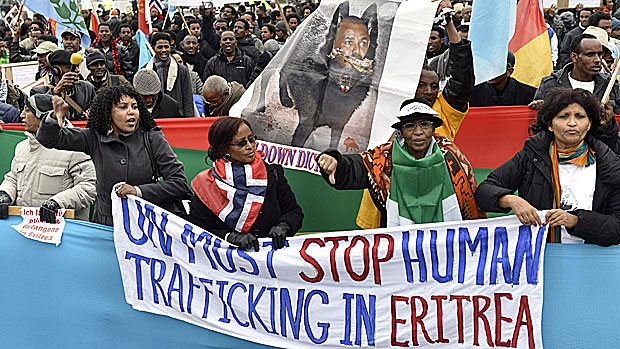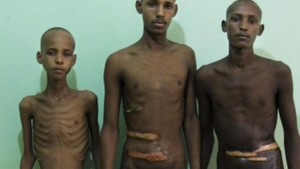Our Special Correspondent
Saba Makeda
Somewhere inside Eritrea, 10th November 2014
The presence of and the actions of Dimhit (the militant of Tigray People’s Democratic Movement) in Eritrean towns and cities is generally seen by Eritreans as an insult, generating resentment and increasing the likelihood of open confrontation. Such confrontation is further facilitated by the wide availability of weapons thanks to the People’s Militia programme. In October 2013, Demhit troops were deployed to round up Eritrean youth in Asmara ( the capital city) , at the time much of the nation was in mourning over the drowning of over 300 Eritreans in Lampedusa, the young Asmarinos reacted to the round up, shots were fired and Demhit militia were beaten and wounded.
 The mutiny of January 2013 (Forto) is an indicator of increasing frustration with the Isaias regime .The fractures within the Regime are such that increasingly more and more members of the inner circles are expressing dissatisfaction. In 2012 the Minister of Finance Mr Berhane Abrehe was dismissed, after 11 years of service, because he made the mistake of questioning the Government accounting practices in the mining sector.
The mutiny of January 2013 (Forto) is an indicator of increasing frustration with the Isaias regime .The fractures within the Regime are such that increasingly more and more members of the inner circles are expressing dissatisfaction. In 2012 the Minister of Finance Mr Berhane Abrehe was dismissed, after 11 years of service, because he made the mistake of questioning the Government accounting practices in the mining sector.
In the same year key elements within the military openly defied the wishes of the President specifically in the absence of the President, the Minister of Defence Sebat Ephrem, Eritrean Air Force Commander Teklai Habteselassie; and Internal Intelligence chief Simon Debregindel, established a senior military committee to manage security in direct contravention to the wishes of the President who had appointed General Teklai Kifle (Manjus) as his commander in chief.
In the same year, again in open defiance to the wishes of the President, the Minister of Defence (Sebat Ephrem) and General Tewil visited imprisoned military personnel in Asmara. (UN Eritrea Somalia monitoring Group 25 July 2013)
[embedplusvideo height=”400″ width=”590″ editlink=”http://bit.ly/1tvuQeO” standard=”http://www.youtube.com/v/Q4oah21Y-KE?fs=1&vq=hd720″ vars=”ytid=Q4oah21Y-KE&width=590&height=400&start=&stop=&rs=w&hd=1&autoplay=0&react=1&chapters=¬es=” id=”ep4425″ /]
The discontent amongst the military was further augmented by the increased support provided by President Isaias to the “People Militia “a programme managed by General Manjus that started, to the great consternation of the Eritrean people as well as senior military leaders, in 2008. The Peoples Militia programme has placed a large number of weapons in the hands of civilians and out of the direct control of the Ministry of Defence. Presently the weekly and bi weekly drills of the People’s Militia have virtually stopped for lack of attendance.
In the meantime the army continues to be weakened by the disappearance of many conscripts and junior officers within the country, due to both arrests, people hiding to escape conscription, as well as escaping across international borders.
The Regime continues to be impacted by defections, the most recent and widely publicised defections were the defections of 3 Eritrean Air force pilots as well as that of the de facto Minister of Information Ali Abdu in 2013. The defection of the latter has resulted in the arrest of member of his Father Abdu, Brother Sam and his daughter.
Additional evidence of the a high level of unrest as well as frustration with the Regime are the actions recently taken by both the Eritrean Orthodox Church as well as the Roman Catholic Church ( the two largest Christian Churches in the country).
On 01 January 2014 the Orthodox Church excommunicated Mr Yoftahe Dimitros[1] and Mr Habtom Resom two officials imposed on the Orthodox Church by the Eritrean Government. The excommunication was for corruption, dictatorial administration, improper excommunication of member of the church; unlawfully monopolising the power of the Holy Synod and the papacy of His Holiness the Patriarch and the Archbishops. This excommunication was signed by the Abbots of the oldest monasteries in Eritrea.[2]
On the occasion of Easter 2014, the Catholic Bishops of Eritrea added their voices of dissention and reprimand with a thirty eight (38) page pastoral letter with the title : “Where is my Brother ?“. The letter clearly outlines the failure of the Eritrean Government in managing the country and in particular it sets out the Government’s responsibilities toward the youth of the country and the plight of the youth running away from the country. This is one of the few documents written by an Authority that has managed to speak to the youth of Eritrea and that has recognised their suffering and their plight.
 I was with Eritrean youth in the Diaspora when they read the pastoral letter. They read the letter with tears in their eyes and reverence in their voices and with a feeling that somebody finally understood the depths of their despair and this gave them hope.
I was with Eritrean youth in the Diaspora when they read the pastoral letter. They read the letter with tears in their eyes and reverence in their voices and with a feeling that somebody finally understood the depths of their despair and this gave them hope.
It is a pity that this letter has not yet been translated into English and Arabic such translations would allow a wider sharing of the message it contains clearly showing that Eritreans are fast reaching a turning point in their history.
From 24 October 2014 the Eritrean grapevine was very active with information of tensions in Asmara and in Eritrea generally. Families in the diaspora were sharing news that in addition to the usual problems of lack of fuel, lack of electricity, water shortages, ever increasing food and commodity prices, people who had been demobilised for medical reasons had been asked to report to their units and member of the People’s Militia had been asked to report to the SAWA military camp.
The extra ordinary thing is that the majority of the people called report for national service, including the youth, have not reported to their designated area and clearly have no intention to report. This is an unprecedented act of mass Civil disobedience as it is happening across the demographic groups. In the face of such large scale disobedience the Government is resorting to its usual black mail and extortion tactics of arresting family members. However, unlike what has happened in the past this time the tactic is not working people are not showing up.
In addition families in the Diaspora are hearing that members of the People Militia have been ordered to return to the Government their weapons, and that the People’s Militia is disobeying these orders.
[embedplusvideo height=”400″ width=”590″ editlink=”http://bit.ly/1tvwblK” standard=”http://www.youtube.com/v/HlOfhPrmHOY?fs=1&vq=hd720″ vars=”ytid=HlOfhPrmHOY&width=590&height=400&start=&stop=&rs=w&hd=1&autoplay=0&react=1&chapters=¬es=” id=”ep8084″ /]
The people who are now disobeying the directive of the Eritrean Government are not the youth, they are President Isaias’s Peer Group and the Elders. According to the Eritrean grapevine there has already been an extensive round up in Mendefera. There are fears that major round ups are planned for all major towns and cities and that once again the Regime will resort to deploying the Tigray People’s Democratic Movement (TPDM) also known as “Demhit”. There are already reports of the deployment of Demhit in Asmara. Such tactic is likely to result, as it did in October 2013, in conflict. Already the talk is of retaliation. [3]
The Arbi Harnet campaign is continuing to engage with both Eritreans in the country as well as outside and it is continuing to be a source of information. We are, however, not hearing the voice of the Eritrean Opposition Parties outlining a programme for the country post Isaias Afeworki.
The danger is that, the Eritrean opposition in the diaspora, after waiting for so long for Eritreans in Eritrea to react, remains fractious and is not ready to lead the country through a transition leaving space for a possible Military takeover. After so much suffering and sacrifice such an outcome would definitively be an unfortunate result.
Saba Makeda
makedasaba@ymail.com
(2 -fine)
[1] Mr. Yoftahe Dimetros served as Ethiopian Ambassador in Israel in the Derg Government, now he is working as General Secretary of the Holy Synod of the Eritrean Orthodox Church (EOC) ( source Jelal Yasin Abera). The father of Yothahe Dimitros – known as Keshi Demitros conducted a negative campaign against those members of the clergy who were opposed to the Unionist cause – http://www.ehrea.org/otherm4.php
[2] ( Monastery Kudus Yohannes, Debre Bizen, Gedam Tsaeda Amba Selassie, Debre Sina, Detre Tsege Sef’a; Debre Libanos)
[3] http://www.theguardian.com/global-development/poverty-matter/2014/oct/28/eritrean-resistance-pressure-isaias-afeworki
Here you can read the first article on the dossier Eritrea
The Forto Incident and the Repression of the Regime


Correction to the article Dossier Eritrea 2 The Dictator in Crisis. The Letter of the Eritrean Bishops has in fact been translated into English. I have found two translations on the net:
1 – Official translation at : http://amecea.blogspot.ch/2014/06/eritrea-nuncio-for-eritrea-appointed.html
2- translation made by Eritrean web sites at : http://awate.com/pastoral-letter-a-complete-and-literal-translation/
thanking all the unseen Eritreans , and supporters, working very hard to make such material available in as many languages as possible.
Makeda